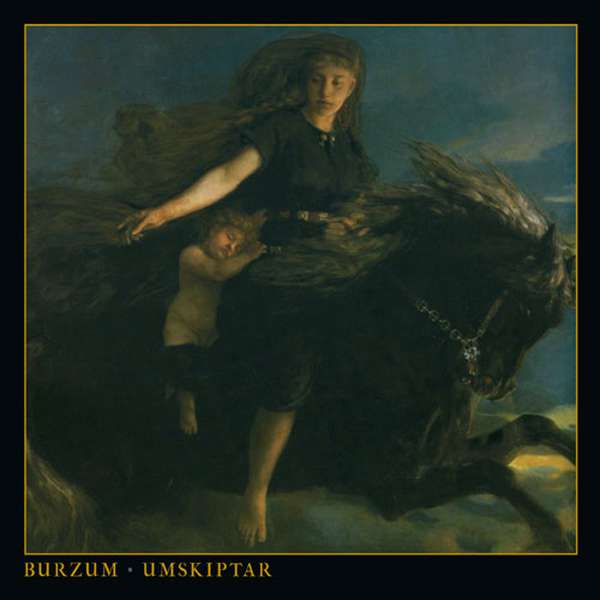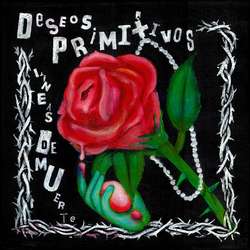The prolific post-prison output of Burzum has verged on the slightly more experimental side of the black metal musical spectrum. Taking a more ambient turn after career highlight Filofosem and incorporating a neo-classical edge in Belus (2010), a new sound was forged by Varg Vikernes after his incarceration. Belus encapsulated a purer tone; less cold and frostbitten than previous efforts and led into the release of Fallen in 2011, a record that was a natural progression and a more fully realised version of the “new” Burzum. It’s no secret that Vikernes has had a massive impact on the black metal scene of today; his actions during the early 90s and the faltering steps of the second wave black metal movement that led to his arrest and conviction for the murder of Mayhem’s Euronymous will go down in history, and even now, so many years later his influence echoes. A noticeably indifferent aura surrounds Vikernes; his calmness and cool attitude that was seen during on-screen interviews in the film Until The Light Takes Us gives him an atmosphere of apathy and its difficult to reconcile this persona with the music produced. Because when Burzum is good.....it’s incredible to witness.
And so is Umskiptar also incredible to experience? Maybe. If Belus and Fallen were to your taste then there is much in Umskiptar to enjoy. The thematic evolution is clear and the narrative is particularly involving yet Umskiptar seems to lack that certain something, that key Burzum ingredient. Vikernes himself. Yes, he plays every single instrument. Yes his deep incanting tone is mesmerising, but these are not his words that spill forth. Vikernes has borrowed heavily from Skaldic sources in the past, from literature and legend, but the words intoned have been his own. Here he lifts sixty-six stanzas from the Icelandic Poetic Edda Völuspá (it is the story of the creation of the world and its forthcoming end) to form the lyrics for Umskiptar (Metamorphoses), yet speaks them in his native Norwegian tongue.
“Jóln” is the first track proper after the introductory nature of “Blóðstokkinn” and comes complete with a fairly intriguing drum track, something that can only be described as a jaunty “clicking.” Certainly not the grim tones we’re used to hearing from Burzum. There’s no mistaking that vocal though; rich and full in the deepest moments of spoken word, truly terrifying in the raw power it holds in the cavernous and maniacal laugh that seeps into the traditional Burzum guitar sound. It’s these moments that call to mind the Burzum of old and not the almost laughable character we see today. After writing a book, “Sorcery and Religion in Ancient Scandinavia,” Vikernes took his manifesto to an entirely new level and often contributes dubious essays to his website. Of course we have always been aware of his questionable politics and beliefs but those never filtered through into the music which meant it was easy to separate the two forms of Burzum; the band, and the man.
Umskiptar is a journey; and the hour and then some running time does nothing to abate the fear that Vikernes is just messing with us, seeing how far he can push those that seek out his work regardless of his personal convictions. Belus was a step in the right direction and Fallen was positively vicious, and whilst Umskiptar has a ferocity (the scream in “Æra” is horrifying in its rage) it’s not quite enough. It feels....safe. A word one would never have thought to associate with this controversial act.
It’s not all bad news though. The initial stages of “Valgaldr” are interesting enough to hold the attention; the guitar progressions are tight and build a deliciously claustrophobic atmosphere, Burzum’s previous dalliances with dark ambient filtering into the somewhat monastic vocal that hits in the middle. The hypnotising “Galgviðr” comes in waves of distorted and staggered guitar strikes, the vocal thick with historical precision and conviction. The delivery is difficult to argue with, Vikernes genuinely has a passion for his material and it’s here that Umskiptar doesn’t completely fail as a musical work. “Gullaldr” is gentle ten minute ode that features a restrained performance both vocally and instrumentally. Fairly minimal in tone and structure it’s a different side to this record, and has the poem speaks of the end of the known world it could be an acceptance of a fate handed down and the wait for rebirth.
Umskiptar is complex, as is the relationship between Burzum and such great works as Det Som Engang Var and Hvis Lyset Tar Oss, and the musical endeavours we see today. Whilst the progression is obvious and is there to hear quite clearly, there is always the danger that Varg Vikernes is becoming a parody of himself (have a look at the promotional pictures for the record) and it’s a shame - in the sense of what has come before - to see that happen. Umskiptar is flawed, yes, as is its maker, but there is sufficient development in the record to hold interest if you delve deep enough to find it.





